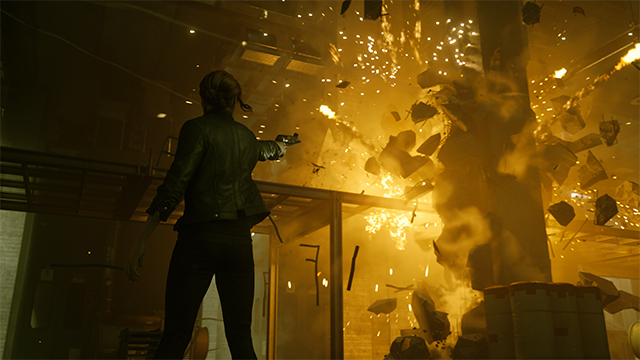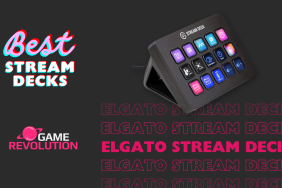Remedy is used to making linear, story-driven games but Control, the studio’s upcoming title, is going in a slightly different direction. It’s still heavy on the narrative but it’s also got bigger environments with no objective markers and more obtuse storytelling. This isn’t just a change for change’s sake; it’s all part of Remedy’s newfound mentality of trusting the player. To explain this change, Narrative Designer Brooke Maggs and Game Director Mikael Kasurinen sat down with us to discuss this philosophy, how Dark Souls inspired it, and its relation to the “new weird” genre.
GameRevolution: I noticed that weren’t any location waypoints. You had to actually look around at signs to figure stuff out. Was that a conscious choice?
Brooke Maggs: Yes. There are signs in the environments which makes puts you in the habit of looking around and finding things in the environment that can tell you where to go. There’s a map you can refer to. But we were even saying earlier that if you have something like that in the environment and you waypoint your way through, you’re only ever going to go to that waypoint unless you curiously go off to the side. But that waypoint will still be in your mind. Whereas it’s possible to now go off the beaten path and find a side mission and a new ability and then come back and start to find your way through.
There are enough clues like the way the lighting works to direct players so they will find what we’re pointing them to find. So you might have found the red light and the evade side mission. And there is a clear sign like you can go to the janitor’s office but there’s also this other thing. So if we just had a waypoint, then that decision is almost kind of made for you.
Mikael Kasurinen: And looking back at our previous games, we’re known for linear, story-driven experiences, and we also had like map markers and HUD markers to tell you to go to certain places. And that’s not something we wanted to do here. We wanted the player to just look at the world and push the responsibility to the player.
You can choose what to do. We’re not going to push you into a certain direction. You have options and can go pursue that new ability or follow the main campaign if you want or there might be some exciting stuff you explore over there. And that’s kind of been our core philosophy of this game: to avoid spoon-feeding and telling the player what to do and trust that they’ll find their own way of playing the game.
GR: I found it more immersive because I actually had to physically look at the signs like Jess would have to.
MK: Exactly. You look at the game a different way. You’re not looking at the HUD markers, you’re actually looking at the wall. And we wanted to tell a story through the environment as well. Like what’s happened here or what’s going on over there? You don’t have a distraction of a marker telling you not to look at that stuff but to go over to the waypoint.
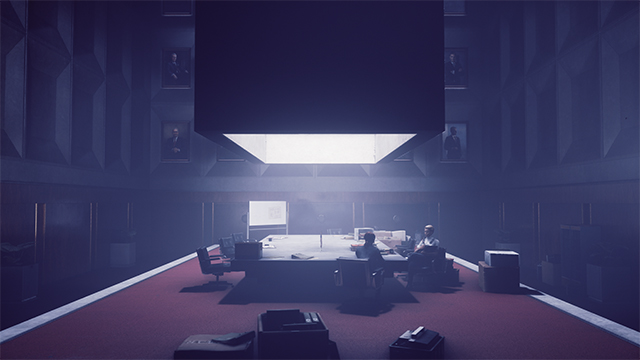
GR: Why make a bigger game when Remedy is known for more linear experiences?
MK: There are multiple reasons. The first reason, from a creative standpoint…
BM: Let’s do something different. Let’s do something new.
MK: Absolutely. And it’s been kind of a personal inspiration for me. I love action RPGs and games that are more open and let the player figure things out. And it’s been a game that I’ve wanted to make for quite a while.
Earlier on, when Sam [Lake, Control‘s creative director] and I started figuring this game out, I wanted to create a game that gave players the agency to figure their way through this and a more open, large experience and be a world that you wanted to return to over and over again. And we agreed on that immediately. And people got excited over that. Like we’ve done this linear thing before and now we are doing something different.
The other aspect is that there is a stronger value proposition for the audience. Like they get this entire world they get to experience. And it’s a more exciting product in many ways. It still has the things that we are known for like quirky, interesting characters and a compelling plot. So all of these Remedy elements are still there but they’re expressed in a different way with more choice for the player.
GR: Control has such an odd premise. How do you make a compelling, weird mystery that makes sense?
BM: It’s tricky. The unique aspect of the new weird literary genre is what inspired this particular story, which is about a young woman looking for answers to her past about her brother that went missing after a supernatural event. And then putting that into the supernatural, new weird is a way to ground strange mysteries in the modern day.
MK: And there are many pop culture movies and books like Twin Peaks and 2001: A Space Odyssey. It’s a great expression of what it could possibly feel like when you encounter something that is beyond comprehension. Like if you witness something that you can’t even grasp and what is going on and a huge part about new weird is facing these kinds of things that we try to understand. But at the end of the day, we don’t really know.
BM: I kind of relate it to the first few episodes of Stranger Things as well. It sort of leads you into it and you’re not sure what you’re getting into. They’re a bit more forward about what the characters are facing in terms of the supernatural stuff and we’re stayed more mysterious. But I think it’s becoming a bit of a trend in TV. If we want people to turn off Netflix and play Control, we need to be just as complex and interesting in our worlds and narratives. And the best part about is that you get to be the director.
MK: And one of the challenges we had… well, maybe not a challenge but it just having a different direction. We looked back at Quantum Break and Alan Wake and we spent a lot of time in the beginning of the game delivering exposition. It can take a while until things start to happen. And those locations and environments you’re in are relatable and understandable but with Control, it’s a weird place and you start seeing that immediately.
And when we thought about it, we thought about the best way to start this experience. And we thought we would just throw Jesse in the with player to the deep end. And even though the player and Jesse see things they don’t understand, let’s not worry about that. Let’s not stop and explain everything as you see it. Things might start adding up and you don’t really get it but as you go through the experience, you will see hints and ideas. And the players will pick up the hints and start to piece it together themselves.
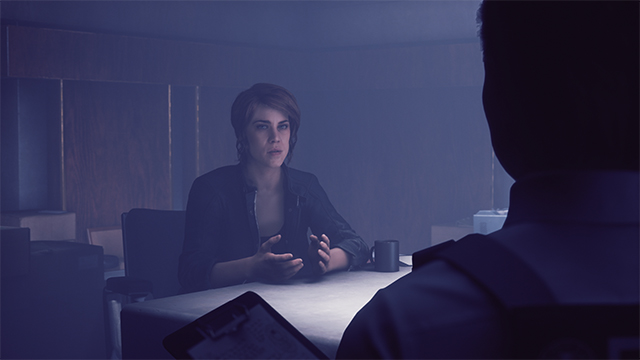
GR: Are you scared are going to get confused?
MK: No, because it is part of the point.
GR: Because you’re getting confused with Jesse?
MK: That’s exactly right. Jesse is confused so it’s fine for you to be confused as well, right? You’re there with Jesse. You walk in through the doors and within 10 minutes, you realize this place is way more complicated than you imagined and it’s a supernatural place that seems to be infinite in all directions. The outside world is perfectly normal. It’s what we see. It’s what Jesse understands as well until she steps through the doors and sees this strange place.
And we have these connection points to the mythical ideas like the Sword and the Stone where whomever is able to pull off the sword becomes the king.
GR: So her gun picks her?
MK: Exactly. So we have these mythical connection points that we are creating. So how old is that gun? Maybe it was something else back in the day? So we want to feed these little ideas and make people think.
BM: We have spent so much time thinking through the lore and logic about how the story world works. So even though we are not completely telling everything up front the whole time, I think it’s still important that we [the writers] know what’s going on. So it’s confusing but not on our part; we understand what we’re doing. But we’re purposely making things a bit obscure to encourage people to explore to unfold answers to those questions over time and then pose some new questions throughout. We have to know how our world works and how these forces work but we can still give lots of mystery to the player.
Everyone else wants to explain things about their world because they’re really excited about it because they want to have people understand the cool thing that they’ve created. [But here] it’s like a design by subtraction where we give people things to hold onto.
MK: It’s a key thing that we want players to participate in the experience a bit and take time to explore and figure things out. We’re not going to come to the player and say what is going on. It’s also trusting that players will find a way through this.
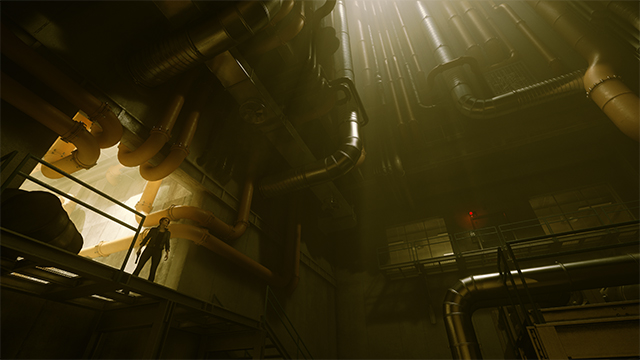
GR: Why do trust the players so much?
MK: It’s just from a personal thing. I love games that give me the world as it is and leave it to me to understand it. I need to take responsibility and I love games like that. I have to believe that others like games like that too. It’s really that simple in many ways.
BM: If you don’t have characters explaining things to you all the time, then immediately what you’re going to do is create a story to explain what you’re seeing. So people will do that naturally if you give them the space to do it. So I trust that we’re story-based beings who want to piece things together and give meaning to the experience and I also think that we have a lot of environmental storytelling going on. I trust players because there’s a lot to draw on here and we’ve given them space to interpret it.
It’s a disciplined thing to do. Because sometimes you want to hold their hand and go “Look at all the things I made for you! Please don’t miss out on anything!”
MK: It’s why I [think of] Dark Souls. They have an amazing, complicated world that they’ve created but nobody comes and tells you. But [it’s only apparent] when you look at different items and the descriptions and draw connection points. When you piece stuff together yourself, it’s just more compelling. You get more invested. It’s you who integrated everything you were seeing and not someone telling you what to think.
When you look at the way people play Bloodborne or the Souls games and how they try to understand it, it gives us confidence that it works and we can embrace that [style of storytelling].
BM: We’ve done new things with this game and I hope that people will enjoy it for that and give it some time to really get into it. And I think because of that exploration and not overexplaining, it will require people to stick with it for a while and be charmed by all the strangeness. I hope that that comes across.
